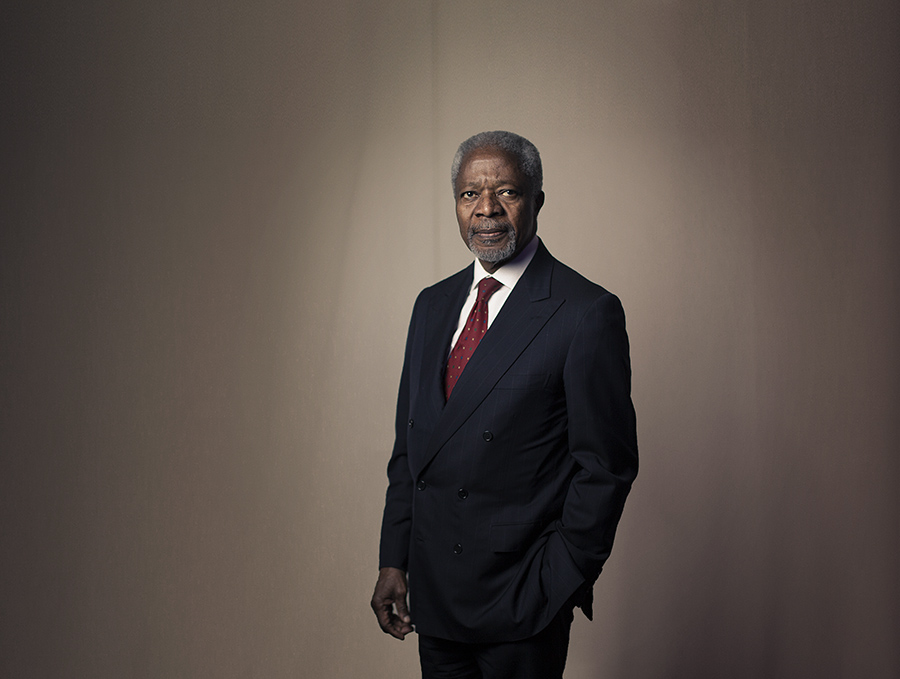The former Secretary-General of the United Nations (UN), Mr. Kofi Annan, died recently in Bern, Switzerland, after a brief illness. He was 80, yet the outpouring of grief and heartfelt tributes from the world’s leaders were phenomenal. He was one of the world’s authority figures in matters of war and peace. He was the chairman of the Elders, an international organisation of a few select men of substance and wisdom founded by Nelson Mandela. He won the Nobel Peace Prize in 2001, a prize he shared with the UN, the organisation he devoted a lifetime serving.
READ ALSO: Adieu Kofi Annan, servant of peace
He was born in Kumasi, Ghana, and enrolled in 1958 to study Economics in what is today the Kwame Nkrumah University of Science and Technology. He subsequently received a Ford Foundation grant which enabled him to continue his studies at the Macalester College in St. Paul, Minnesota, United States in 1961. He then went on to study International Relations at the Graduate Institute of International Development Studies, in Geneva, Switzerland, from 1961-62. In 1971-72, he studied at the Massachusetts Institute of Technology (MIT) Sloan School of Management where he earned a master’s degree in management.
His first point of contact with the UN was as a budget officer for the World Health Organisation in 1962. He later worked in most UN departments in different capacities.The last position he held was Deputy Under-Secretary-General for Peacekeeping Operations, before he was elected the Secretary-General.
READ ALSO: Kofi Annan: Activist who led the UN
His election was a turn of good fortune for the world, for Africa, and the UN as an institution. He knew the international system and its nuances inside-out; he had laboured in every nook and cranny of the UN system. He was by nature a humanitarian, a man of courage and convictions. The robust health programmes of the UN, including HIV-AIDS, Malaria, and others, the Global Fund, the Millennium Development Goals, are part of his legacies. He instituted the most ambitious programme to fight poverty ever imagined and being a practical man, he made sure he set the markers in specific terms and because of his work, every year, many more millions would be freed from poverty all over the world.
Annan urged the UN to “free our fellow men and women from the abject and dehumanising poverty in which more than 1 billion of them are currently confined.” Conscious of the criticisms of the UN system in the United States and elsewhere, he initiated a total overhaul of UN administration and ensured he brought it into the 21st Century. No other Secretary-General would have been able to do it. He cut costs, straightened out and closed loopholes and made the institution self-accounting. He was allergic to corruption and he stamped it out of the UN system. His reforms assuaged the US critics, especially, the Republicans, who often flattered themselves with the thought the US was paying too much money to the UN.
From Darfur to Lebanon through Bosnia to East Timor, Iraq, Afghanistan and the cauldron in the Middle East, the UN Secretary-General’s schedule would turn a young man grey in a year. Because he was a man of principles, he was always certain when to tell people ‘no.’ It is part of his extraordinary gifts that he was able to say no without giving great of- fence. His relationship with the US was based on his courage to help in the peace efforts in Bosnia.
The US soured when he warned it not to invade Iraq without obtaining a resolution of the Security Council as demanded by the UN Charter. When he was ignored, he labeled the war illegal which irked the Americans to no end. He didn’t win all the time. His “stubborn optimism” blindsided him on Rwanda. The slaughter of 800,000 men, women and children, in an African country, did not cross his imagination. He tried to make amends by initiating the “Responsibility to Protect” doctrine by which the UN can no longer watch but must act to protect endangered vulnerable communities. He was effective in Nigeria’s transition to civil rule, a service he continued in 2015.
He was one of the world’s great leaders. Even after he had retired, the world still tried to enlist him for peace. In Syria, the Arab League nominated him as its representative to try to find a solution in Syria. When he resigned from that position in 2012, it was the first sign that the Syrian War would be long, hard and costly. May his soul rest in peace.
READ ALSO: Israel says Assad back in charge, Syrian front likely to be peaceful

